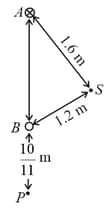A very long straight conductor has a circular cross-section of radius and carries a current density . Inside the conductor there is a cylindrical hole of radius a whose axis is parallel to the axis of the conductor and a distance from it. Let the -axis be the axis of the conductor, and let axis of the hole be at . Find the magnetic field (i) on the -axis at (ii) on the -axis at
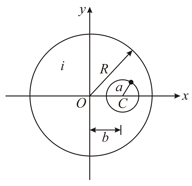


Important Questions on Magnetic Effect of Current
A wire loop carrying current is placed in the plane as shown in the figure (i) If a particle with charge and mass is placed at the centre and given a velocity along (figure). Find its instantaneous acceleration. (ii) an external uniform magnetic induction field is applied, find the torque acting on the loop due to the field.
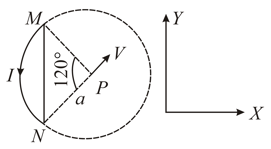
Find the work and power required to move the conductor of length shown in the figure one full turn in the anticlockwise direction at a rotational frequency of revolutions per second if the magnetic field is of magnitude every where and points radially outwards from -axis. The figure shows the surface traced by the wire .
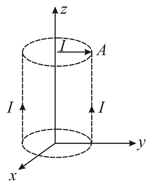
The figure shows a conductor of weight and length placed on a rough inclined plane making an angle with the horizontal so that conductor is perpendicular to a uniform horizontal magnetic field of induction . The coefficient of static friction between the conductor and the plane is . A current of A flows through the conductor inside the plane of this paper as shown. What is the force needed to be the applied parallel to the inclined plane to sustaining the conductor at rest?
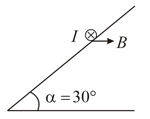
An electron gun emits electron of energy travelling in the -direction. The electron are required to hit the spot where & the line makes an angle of with the -axis, as shown in the figure. A uniform magnetic field parallel to exists in the region outsides to electron gun. Find the minimum value of needed to make the electron hit at .
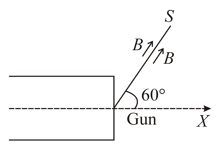
Two long straight parallel wires are apart, perpendicular to the plane of the paper. The wire carries a current of , directed into the plane of the paper. The wire carries a current such that the magnetic field of induction at the point , at a distance of from the wire , is zero. Find
(i) The magnitude and direction of the current in .
(ii) The magnitude of the magnetic field due to induction at the point .
(iii) The force per unit length on the wire .
